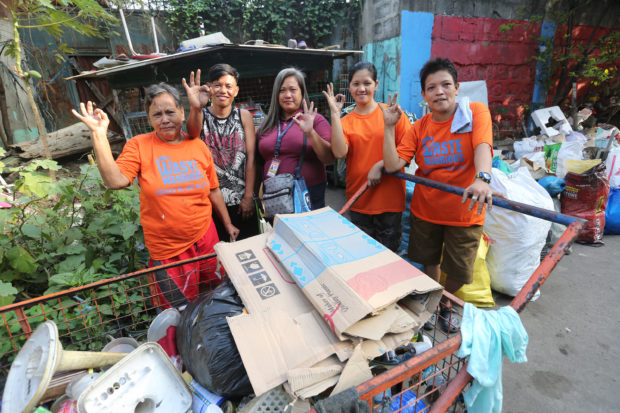
AGE JUST A NUMBER Ester Mendoza (left), with fellow “waste warriors” (from right) Pinky de Galicia, Alminda Barbin, Marcel Mendoza and Emil Ramos, intends to keep on working and making money for her six children while she is still able. —PHOTOS BY JOAN BONDOC
MANILA, Philippines — She may be 65 years old, but Ester Mendoza, a widow and mother to six children who is also one of around 30 “waste warriors” in Malabon City, shows no signs of slowing down.
For many years, she provided for her family by taking on odd jobs. During the day, she was a laundry woman and part-time house helper.
At night, instead of resting, Mendoza would scour the streets of Caloocan City, looking for recyclables to sell to junk shops.
This hand-to-mouth existence continued until she and her family decided to move to Malabon City, where her late husband used to live.
When officials of Barangay Potrero launched a door-to-door garbage collection drive in 2015 with the help of nongovernment organization Mother Earth Foundation (MEF), Mendoza signed up for the program.
“I can only invest on my remaining strength because I did not finish schooling. So as long as I can work and earn money, I will not waste time,” she told the Inquirer in a recent interview.
The program has allowed the Malabon local government not only to minimize plastic waste and encourage trash segregation, but also to provide jobs to low-income families, said Barangay Councilor Khate Nolasco. She manages and spearheads the campaign.
Although there is no formal recruitment for the program, Mariedel Barbin, head of the waste warriors, said that they targeted longtime scavengers in the area.
“Before they were recruited, you would see them sifting through trash then simply throwing on the streets the garbage that they could not sell. Through this campaign, we are giving them an incentive and an additional source of income,” Barbin explained.
Extra income
The waste warriors, mostly women in their 60s, receive a P3,000 monthly salary. They are also allowed to keep the recyclable materials they collect six days a week from the dozens of households to which they are assigned.
Mendoza, for example, earns an additional P1,400 a week from selling recyclables.
According to Barbin, the volunteers are accompanied by a monitor who checks whether the garbage has been segregated. If not, it will be returned to the household concerned.
“Sometimes the owners would argue with me and even get angry if I don’t collect their garbage. But I’m only doing my job, so I explain to them that their trash should not be my problem,” said 39-year-old Maricel Zamora, one of the collectors.
GREEN THUMBS The biodegrable waste collected from households is turned into compost and used to fertilize the garden in the barangay’s materials recovery facility.
To deal effectively with noncompliant residents, they were required to undergo seminars with MEF that included talks on how to properly explain the importance of waste segregation, Barbin said.
Program requirement
“It was one of the incentives we offered them when we pulled them out of the streets: We need them to attend a one-day seminar for them to be qualified, earn extra income and help save the environment,” she explained.
Biodegradable waste, such as food, is transferred to the barangay’s second materials recovery facility, which opened last October. It is then turned into compost for the fruits and vegetables being grown inside the facility.
Nolasco said there were three designated areas in Barangay Potrero where garbage trucks still collect the remaining trash, as well as subdivisions that they had been unable to gain access to due to strict security measures being imposed by homeowners’ associations.